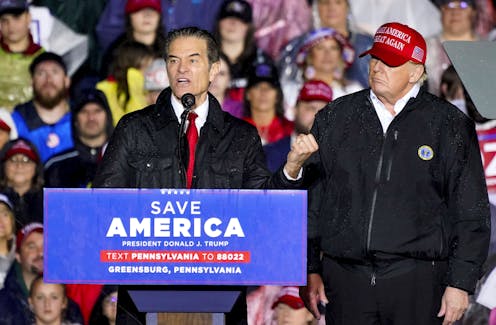Appealing to Trump (and his base) might have worked in Pennsylvania primaries – but it won't play so well in the midterms
- Written by Daniel J. Mallinson, Assistant Professor of Public Policy and Administration, School of Public Affairs, Penn State

The Pennsylvania primaries[1] of May 17, 2022, proved a good night for Donald Trump, a better one for “Trumpism” and a problem for moderates hoping for a candidate primed to capture the center in the upcoming midterms.
Trump’s officially endorsed Senate candidate, Mehmet Oz, is currently in a tight race[2] with main GOP rival David McCormick – with the balloting set for a recount.
Both ran their primary campaign as Trumpist candidates and vied for the former president’s nod[3]. Meanwhile, third place in the GOP race went to Kathy Barnette, a Fox News commentator who touts herself as more MAGA than Trump[4].
The fact that all three leading GOP candidates had the DNA of Trumpism in them suggests a couple of things. First, it indicates that echoing the policies, rhetorical style and personality of the former president can be an effective tool for Republican candidates seeking to appeal to the party base. And this is especially important in a closed-primary state[5] such as Pennsylvania, in which only party members have a say in who gets to run for Senate.
And second, it raises a question about the tried-and-tested plan of candidates’ appealing to the party base in the primary before pivoting closer to the center in the general election: Will that post-primary transformation be possible for Republicans in Pennsylvania – and elsewhere – in 2022?
All local politics is national
The Pennsylvania primary proved that the adage that “all politics is local[6]” has to some degree been inverted: Local and state elections are now run on national issues and are influenced by national figures.
But whereas a Trump endorsement in the recent Ohio primary resulted in an immediate surge[7] for his anointed candidate, J.D. Vance, Pennsylvania didn’t quite play out the same way.
Oz’s chance of winning was certainly not harmed by getting Trump’s stamp of approval[8]. But he didn’t seem to take many votes off McCormick or Barnette in the process. In fact, some see Barnette faring better than expected[9] because Trump supporters decided to vote for her as “the more Trump” candidate, over Oz as the “official” Trump candidate.
Meanwhile, Trump’s endorsement actually meant very little for Doug Mastriano, who won the state’s GOP primary for governor. Mastriano – an avidly Trumpian candidate who repeats the former president’s election conspiracy theories – was already pulling ahead[10] by the time Trump made a late nod of approval in his favor.
The point is, whether these Republican candidates are seen as being faithful to Trump’s signature MAGA cause is what matters when it comes to winning in these primaries.
But here’s the rub for Republicans. That may work well enough in firing up the base during primary season, but it complicates the pivot to running against Democrats – and appealing to more moderate voters – in the midterm election. A candidate like Mastriano will have to defend positions like[11] a total ban on abortion, reversal of support for mail-in voting and conspiracy theories about the 2020 election.
Pennsylvania is seen as a toss-up state[12] when it comes to the Senate vote. In such circumstances, appealing to the center becomes more important – party faithful tend to be locked in; swing voters are up for grabs.
Any GOP candidate who hitches his or her wagon to Trumpian policies and rhetoric may find it harder to appeal to centrists – and may actually alienate some moderate Republicans.
Circling back to the center
A similar dynamic played out in Pennsylvania in the Democratic primary race for Senate, but with success found by positioning policies to the left of the center. One of the more progressive candidates, Pennsylvania Lt. Gov. John Fetterman, prevailed against[13] the moderate Rep. Conor Lamb.
But even so, Fetterman has, I believe, more room to maneuver come the general election. Fetterman has experience running for – and winning – a statewide office before. Moreover, he has carefully cultivated an “everyman” image, which could play well against either Oz or hedge fund CEO McCormick. Even so, he will have to defend more progressive positions that could also turn off moderate Republicans.
Success in the Pennsylvania primaries came to those candidates able to position themselves away from the center and more in line with the party’s ideological extreme. But it is the Republican candidate, in vying against others for Trump’s blessing as well as his base, who might find it more difficult to circle back to the center during the midterms.
References
- ^ Pennsylvania primaries (www.nytimes.com)
- ^ currently in a tight race (www.wgal.com)
- ^ vied for the former president’s nod (www.cbsnews.com)
- ^ more MAGA than Trump (time.com)
- ^ closed-primary state (www.fairvote.org)
- ^ all politics is local (fivethirtyeight.com)
- ^ resulted in an immediate surge (www.independent.co.uk)
- ^ not harmed by getting Trump’s stamp of approval (www.politico.com)
- ^ faring better than expected (www.nytimes.com)
- ^ pulling ahead (www.wgal.com)
- ^ defend positions like (www.nbcnews.com)
- ^ toss-up state (www.politico.com)
- ^ prevailed against (www.washingtonpost.com)
Authors: Daniel J. Mallinson, Assistant Professor of Public Policy and Administration, School of Public Affairs, Penn State

